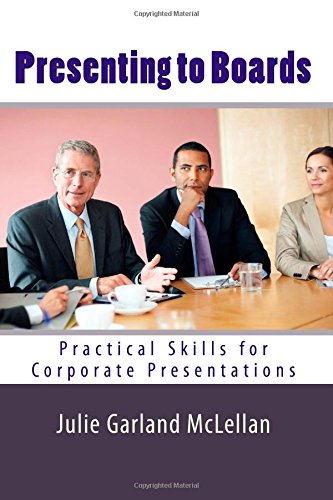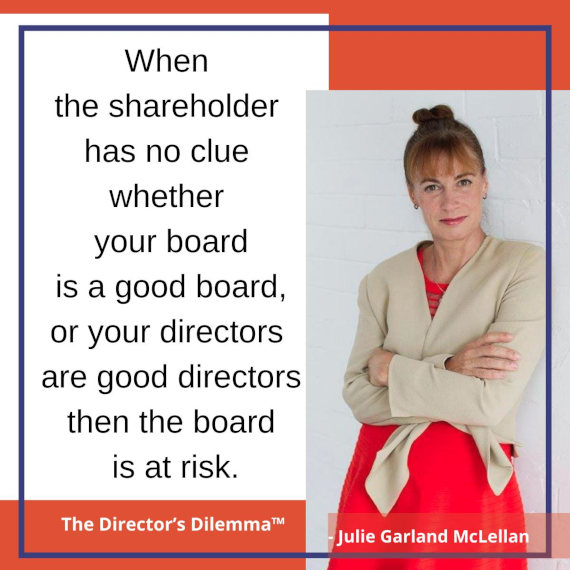|
|
|
|
|
|
|
|
|
Dear reader,
Welcome to the December 2021 edition of The Director's Dilemma. Each month this newsletter looks at a real-life scenario that happened to a board, perhaps to a board like yours, and considers a range of responses. The scenarios are de-identified to protect the individuals concerned. This month our board is considering the vexed issue of how to hold volunteer boards accountable for their governance skills and contribution. As a special Christmas Treat - we have four responses for you to enjoy.
Of course, these scenarios are general, written to help you with practical information without the risks that attach to living these situations in real-life. I work with boards and directors as a confidential mentor to help them build great companies and maximise their impact. If you would like personalised service, please call me.
To read this email in a web browser, go to www.mclellan.com.au/newsletter.html and click on 'read the latest issue'. I hope you will enjoy the latest dilemma:
 Norman chairs a not for profit company that is funded mostly through government grants and partly through membership fees and fees for service. The board members are all enthusiastic volunteers who have either expertise in delivering the services or experience of receiving them. None of them, including Norman, has board or senior executive experience in a business context. Norman chairs a not for profit company that is funded mostly through government grants and partly through membership fees and fees for service. The board members are all enthusiastic volunteers who have either expertise in delivering the services or experience of receiving them. None of them, including Norman, has board or senior executive experience in a business context.
The company is doing well and has been growing steadily through cautious additions to its scope of activity. Three years ago, they accepted some funding that had governance practices stipulated. One of these was a requirement to conduct a board review every three years and to have "an appropriately skilled" board. To keep receiving the funding, they need to undertake a review and develop a board skills matrix before the end of the financial year.
The directors are slightly concerned about how and what to review and very concerned about the prospect that some of them might be deemed insufficiently skilled and have to leave the board. They know that they don't have great financial skills, but the accountant does a good job of keeping records and there has never been a problem.
How can Norman meet the governance requirements to keep receiving the funding without losing the great team spirit of his board?
|
|
|
|
Joy-Marie's Answer
 Governance is about the exercise of ethical and effective leadership by the governing body. Governance is about the exercise of ethical and effective leadership by the governing body.
It is best practice for governing bodies to continuously assess how effective they are in their roles and in meeting the organisation's objectives.
Board evaluations are a useful tool. They contribute to performance of the organisation, board, and individual director. Board evaluations can identify areas of strengths and weakness, leading to changes that positively impact performance and stakeholder value.
For retaining team dynamics; try sub-committees and advisory committees to retain critical skills and team members who may not be suited to the board.
I would recommend an integrated systemic review of the governing body. To assist the Board in exercising ethical and effective leadership, Norman should:
-
Understand the term of office of each board member, to help independence and succession planning.
-
Do a skills matrix assessment - mapping the skills of the current board members against the skill set needed for the Board to operate effectively.
-
Reflect on composition of the Board and any sub-committees.
-
Assess what training requirements the Board may need.
-
Perform a Board evaluation focusing on
a. Leadership
b. Governance
c. Strategy
d. Management
e. Board Governance Administration
-
Once the Board evaluation is completed, embed the learnings with tangible actions, such as training, director coaching, board simulations, etc.
-
Update the integrated Board Review plan, rotate between doing evaluations in house and alternative years using an external service provider.
Directors need to be able to move a conversation from egocentric to eco-centric (i.e. relevant to the organisation's eco-system). Competent directors integrate their functional capabilities with their personal attributes - as well as intellectual curiosity, self-awareness, and passion - to enable effective decision-making.
Joy-Marie Lawrence is a member of the Board of Advisors of the Africa Executive Coaching Council, a Director of WDB Investment Holdings and CEO and Founder of Boardvisory. She is based in Cape Town, South Africa.
|
|
|
|
Diane's Answer
 Norman and the Board can: Norman and the Board can:
-
Review their Board charter to ensure it aligns to current best practice and includes requirements for:
-
all directors to undertake company director training with the costs being meet by the organisation (the AICD Foundations program being the minimum standard)
-
director appointments to align to the directors' skills matrix
-
a 3 yearly Board review
-
Consider an 'independent consultant' to help them update the Board charter and develop a board skills matrix.
-
Engage the whole board in the process.
The first step is to develop the skills matrix which identifies the skills, knowledge, experience and capabilities to meet both the current and future challenges. It's important for Norman and the board to tailor the matrix to the unique circumstances and requirements of their organisation.
Once the board agrees on the matrix, they can then self-complete and then assess as a whole.
The typical skills areas are:
-
Corporate governance
-
Financial and audit
-
Strategy & policy
-
Risk and Compliance
-
Industry Knowledge and experience
-
Knowledge of organisation
-
Stakeholder engagementMarketing and communications
-
Technology and data
The ratings scale is usually 1-5 and the matrix gives the director a section to include supporting comments for their self-assessment. (1 = no experience, some understanding: 2 = some experience and understanding of the topic; 3 = 2-5 years relevant experience; 4 = greater than 5 years' experience and appropriate qualifications; 5 = 10 or more years' experience and appropriate qualifications)
The output of this process will highlight where gaps exist. If Norman and the board have already identified the biggest gap in skills matrix is 'financial skills' then a recruitment process could fill this and other gaps. Following this the board may undertake a board renewal program, so the government funder knows the board is managing board skills and governance appropriately.
Dianne Hill is a non-executive director and audit committee member of University of Technology Sydney and CoAct. She is based in Sydney, Australia
|
|
|
|
Julie's Answer

You don't need to be a 'Wall Street Whizz' to be on a board. You need to understand your finances, and to lead and supervise management. Norman's board members have 'appropriate skills' if they have successfully grown the company to reach its current stage.
If directors are unsure that they have the requisite financial skills for the next stage, the answer is training; not ousting. To be a good director you must be able to read the financial statements. You don't need to know how to write them or to undertake sophisticated analysis. That the board has a skilled accountant and is able to ask that person to explain things when needed, is already a good sign.
If the directors are feeling threatened by the forthcoming review, perhaps Norman can provide training before the review so that directors can truthfully claim to understand the basics of board financial oversight. This training will likely help directors in other areas and, being provided by the company, be considered a reward for their good service.
Even large listed companies don't share a detailed (let alone an easily comparable and quantifiable) skills matrix. Good companies, however, do use one to help them develop and attract directors to keep the company growing and well-governed. A skilled consultant will be able to do a review, draft a matrix and help design some development and training to boost the skills of the board. Experience of receipt of the service is a valid skill to place on the matrix. Directors should find the review an energising and inspiring process.
The funding government has nothing to gain and much to lose by removing good directors who have grown the company. They will understand, support, and appreciate a process of board development.
Julie Garland McLellan is an experienced non-executive director and board advisor based in Sydney, Australia.
|
|
|
|
José Luis's Answer
 As Chair, Norman is the team leader and should steer his group to properly fulfill its duties. Norman needs a professional but clever approach: finding the areas current directors cover and hiring new directors to fill gaps, he should: As Chair, Norman is the team leader and should steer his group to properly fulfill its duties. Norman needs a professional but clever approach: finding the areas current directors cover and hiring new directors to fill gaps, he should:
-
Work with a reputable board consultant to guide process and frame the assessment in current best practices.
-
Clearly communicate the process to be undertaken and obtain directors' support.
-
Assess the individual directors: "Are they guardians of mission, vision and values? Are they thinking strategically? Are they communicating in an effective and respectful manner, able to listen, process information and pose challenging questions...?"
-
Understand the expertise the board needs, in common and as a team. A board should have at least one expert in: products/services, business model and markets, operations and supply chain, IT/digital, intangible assets (risks and reputation), people & talent, finance and legal.
-
International best practice recommends boards of 8 - 10 members, a smaller company might have fewer. One board member may cover two skills. Norman's matrix should link directors to expertise and identify any gaps. Any uncovered skill would require a new director with that specific profile.
The current directors make diverse and rich contributions; they can be retained if there are no redundancies or overlap.
If Norman wants to keep his current team, and there are overlaps, he must determine if current directors have skills to fill new roles and work with them to align competencies with needs. If this is not possible, Norman must determine which board members transition off the board. To hire new profiles to fill the gaps, he must give a specific profile description to an executive search consultant.
Throughout the process Norman must display compassion, emotional intelligence and professionalism to ensure the process remains unbiased and fair, while seeking the best outcome for the company's long-term future.
José Luis Marcó is a Partner at Seeliger y Conde / AltoPartners Spain and a former director of RCD Espanyol de Barcelona and of the international board of AMROP International. He is based in Barcelona, Catalunya, Spain.
|
|
|
|
Julie’s News
November was the month that Australia has been waiting for; after the excitement of hosting a session with governance greats Mervyn King, Bob Garratt, and Peter Dey (you can watch a recording at https://lnkd.in/gRvCYThJ) came the excitement of finally starting to remove Covid
restrictions and get back to normal life.
I did some more board training, including a trip to Dubai and two trips to Canberra. It's such a joy to be back meeting people and helping boards to govern better.
Do you like video?
Readers who follow me on LinkedIn may have noticed that I have been posting short video insights. If you are frustrated about losing them and not being able to find them again or share them easily, you might like to visit and subscribe to my YouTube channel. I won't spam you, and as a subscriber, you will see a link to the channel whenever you visit YouTube. The videos are in two lists: 'Quick Insights' up to three minutes long and 'Presentations and Classes' up to an hour long.
Book Review - Presenting to Boards: practical skills for corporate presentations by Julie Garland Mclellan
 A book of practical skills and tips for making successful board presentations. Most information on presenting is designed to help reluctant presenters to survive their ordeal. A book of practical skills and tips for making successful board presentations. Most information on presenting is designed to help reluctant presenters to survive their ordeal.
Very little is written or taught about how to excel and how to meet and surpass the expectations of highly discerning corporate audiences. Yet that is what boardroom presenters must do.
This book provides practical skills that will help make your boardroom presentations successful.Written by an internationally acclaimed expert on corporate governance and filled with real life anecdotes and helpful tips, this book is a 'must read' for any executive who aspires to succeed in presenting at the highest corporate level.
Available at Amazon.com in paperback and Kindle editions.
Inspirational quote for December

Do you know where to focus your director and board development?
Boards often struggle to get cut through and drive company performance. They work hard, then they work harder, then call in a consultant who recommends some changes, then they work harder still.
If that sounds like your board, don't worry. It is likely that you have simply been focusing on the wrong stuff. I have made a diagnostic tool that might help you to prioritise the actions that will free your board from the drudgery and allow you to maximise your impact. You can take the diagnostic here:
https://directorsdilemma.scoreapp.com
Call me afterwards for a personalised action plan to revitalise and enhance the impact of your board work.
A note on names - A few readers have asked me where I find the names for the protagonists in each case study; I 'borrow' them from people I meet or things that I read. Norman is an English name and means 'Man from the North'. It is often linked to the conquering invaders from Scandinavia and our protagonist Norman must also become a conqueror. He needs to lead his board with confidence towards new skills and a better future.
This newsletter - If you have any ideas for improving the newsletter please let me know. If you are reading a forwarded copy, please visit my website and sign up for your own subscription.
Suggestions for dilemmas - Thank you to all the readers who have suggested dilemmas. They are greatly appreciated. I will answer them all eventually. I could not write this newsletter without your help and without the generous help of all the experts who respond each month to the case studies.
Be a contributor - if you would like to attempt a response to the dilemmas for publication you will be most welcome. Simply reply to this email and let me know. I am always on the look out for new talent from around the world so please reach out if that sounds like something you could do.
Let's connect - I use LinkedIn to share information about boards and directorship with my friends and acquaintances. If you use LinkedIn and we are not yet connected I will welcome a connection from you. You can find me at linkedin.com/in/juliegarlandmclellan.
Let me help you - I would be delighted to speak for or train your board, staff, audience and/or group. If I can help, please contact me at julie@mclellan.com.au.
Farewell until the next issue due 1 February 2022. I look forward to greeting you again then. Best wishes for a successful end to what has been another difficult year for directors and boards. I hope you have a great end of year celebration and come back refreshed and ready for the challenges of 2022.
Enjoy governing your companies!
Best regards,
Julie

Main Photo by Sora Shimazaki from Pexels
Quote Illustration by Keitchy Sanchez
Disclaimer:
The opinions expressed above are general in nature and are designed to help you to develop your judgement as a director. They are not a definitive legal ruling and do not constitute legal advice. Names and some circumstances in the case study have been changed to ensure anonymity. Contributors to this newsletter comment in the context of their own jurisdiction; readers should check their local laws and regulations as they may be very different.
Privacy: I am privileged to have your contact details and keep them as safely as possible. I will alert you if they are ever accessed by any unauthorised person (the technical staff at ayuda help with publishing and issuing the Director's Dilemma and have access so they can send the newsletters to you). I do not sell your details to anyone; they are kept only for the intended purpose - sending you this newsletter and helping to build the judgement of company directors by providing a safe way to consider potential responses to real life events.
|
|
|
|
|
|
|
 Norman chairs a not for profit company that is funded mostly through government grants and partly through membership fees and fees for service. The board members are all enthusiastic volunteers who have either expertise in delivering the services or experience of receiving them. None of them, including Norman, has board or senior executive experience in a business context.
Norman chairs a not for profit company that is funded mostly through government grants and partly through membership fees and fees for service. The board members are all enthusiastic volunteers who have either expertise in delivering the services or experience of receiving them. None of them, including Norman, has board or senior executive experience in a business context.
 Governance is about the exercise of ethical and effective leadership by the governing body.
Governance is about the exercise of ethical and effective leadership by the governing body. Norman and the Board can:
Norman and the Board can:
 As Chair, Norman is the team leader and should steer his group to properly fulfill its duties. Norman needs a professional but clever approach: finding the areas current directors cover and hiring new directors to fill gaps, he should:
As Chair, Norman is the team leader and should steer his group to properly fulfill its duties. Norman needs a professional but clever approach: finding the areas current directors cover and hiring new directors to fill gaps, he should:

